Memoir of John Shakespear Bartley, 1916-1919 - Part 12
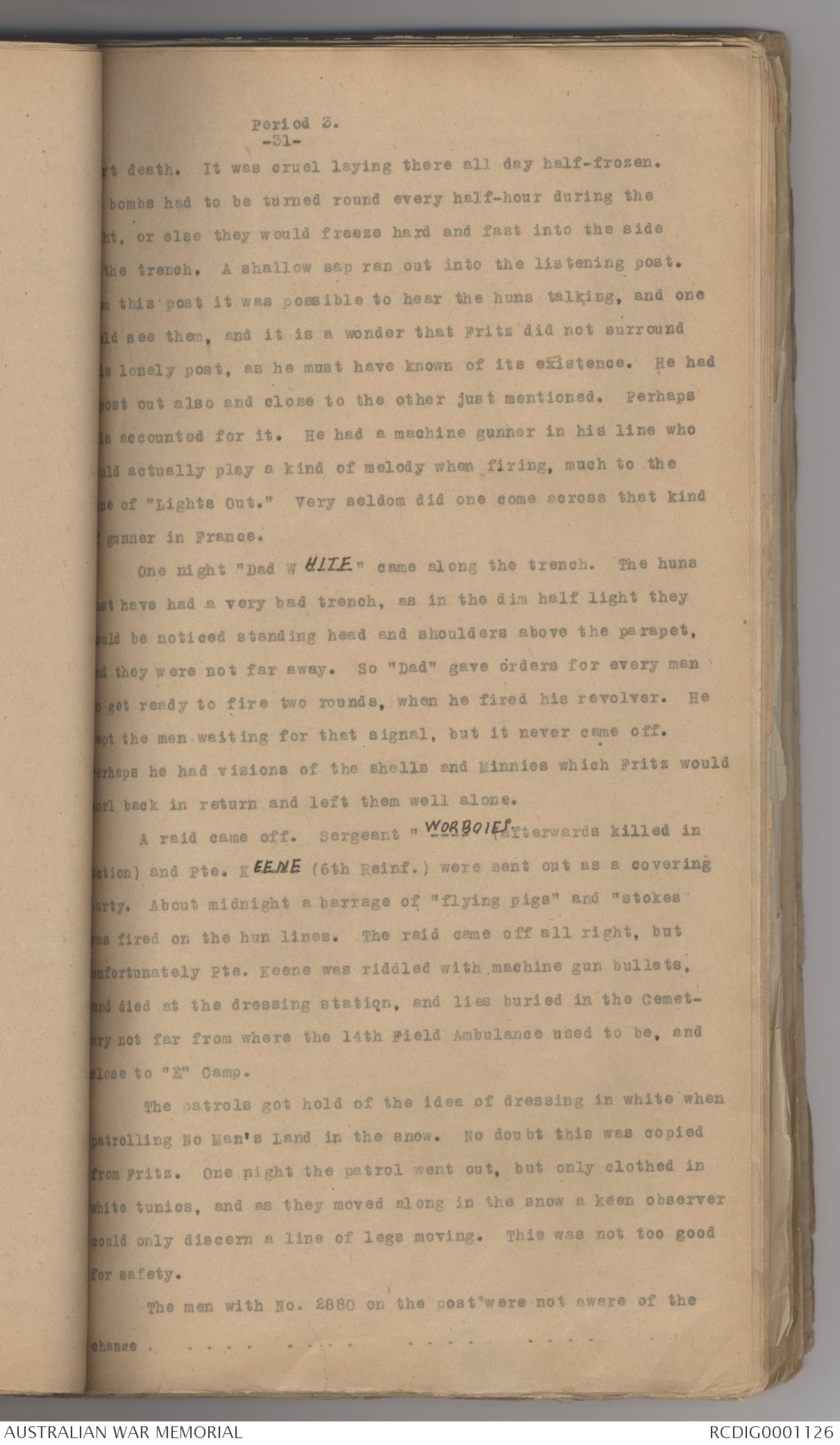
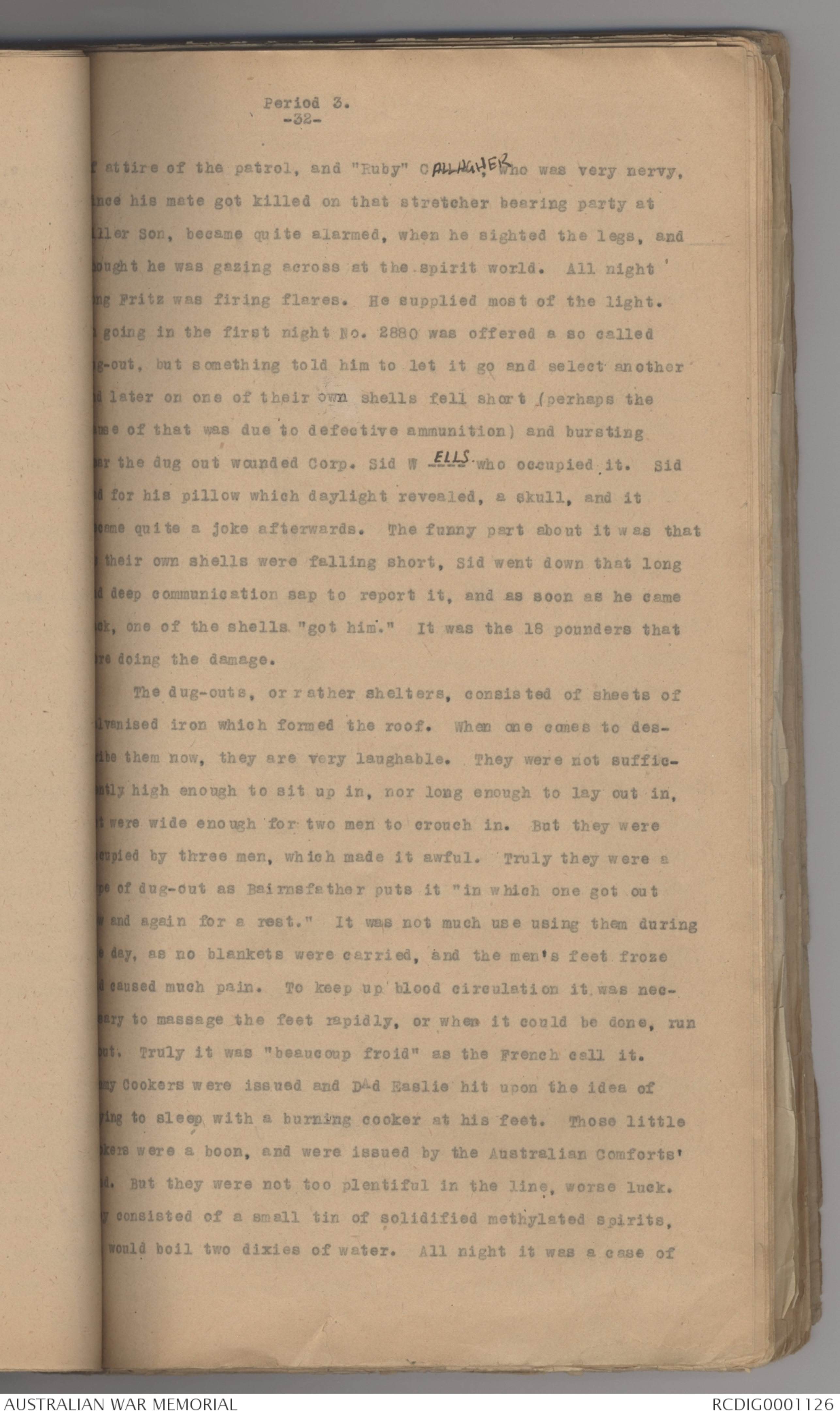
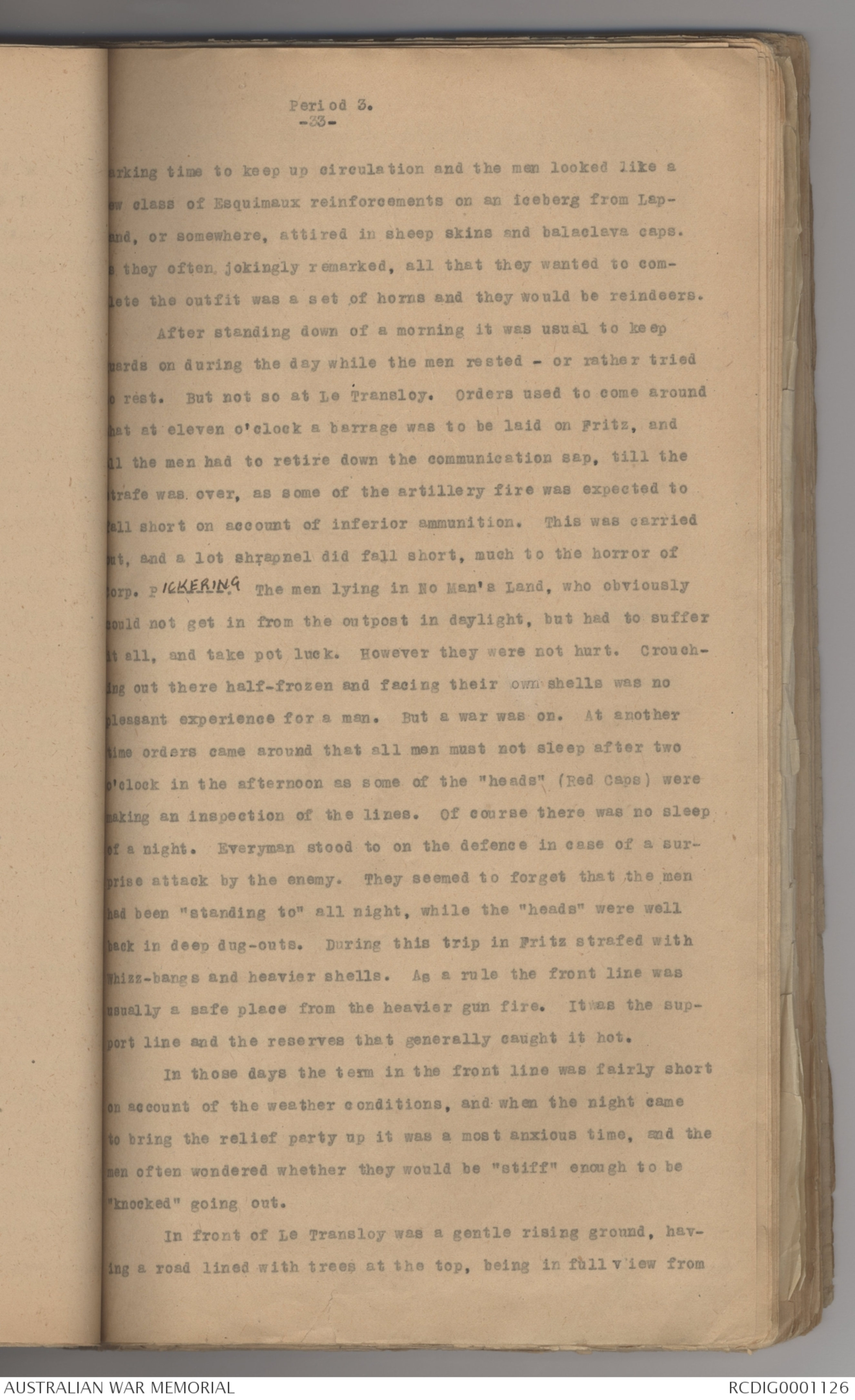
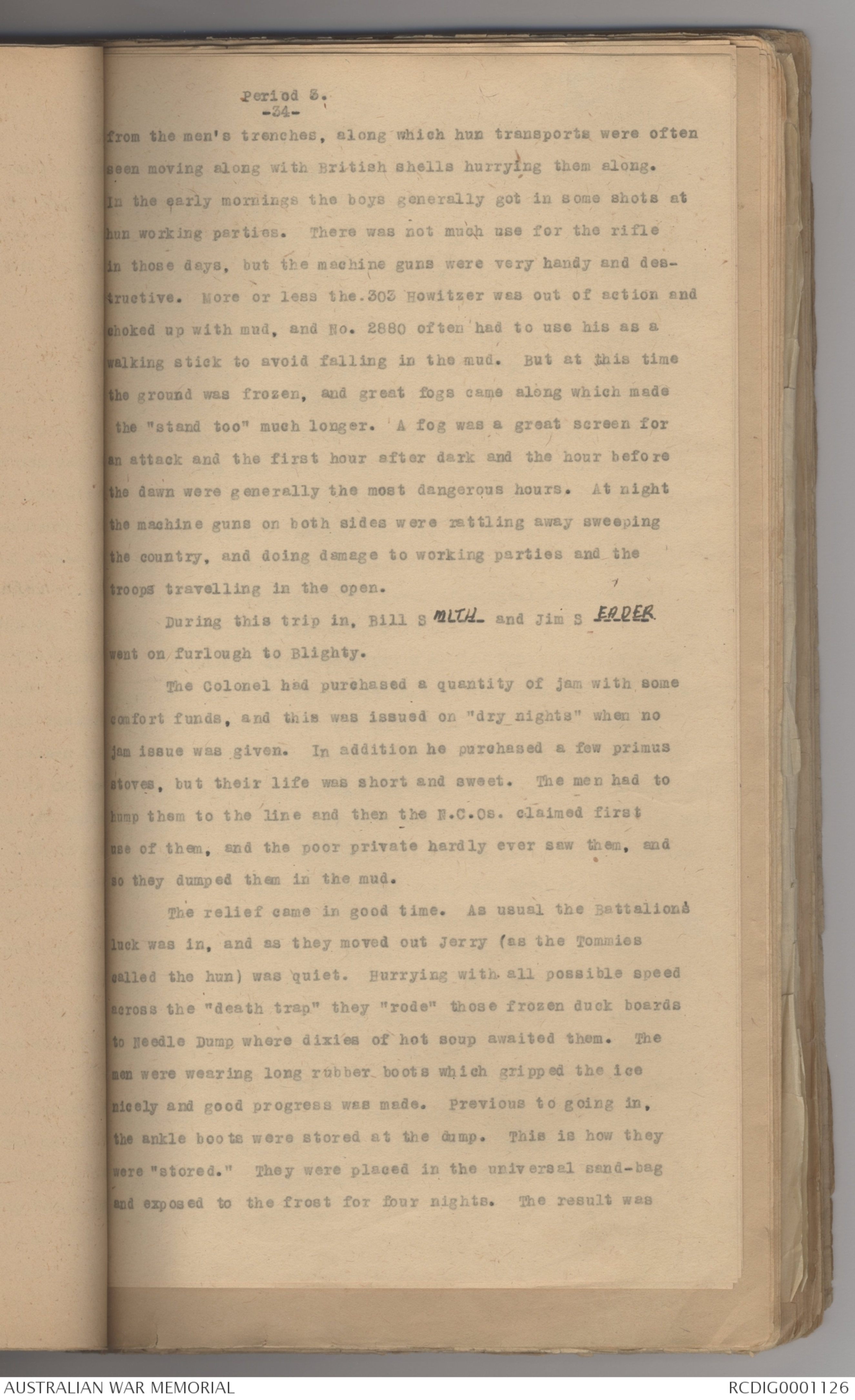
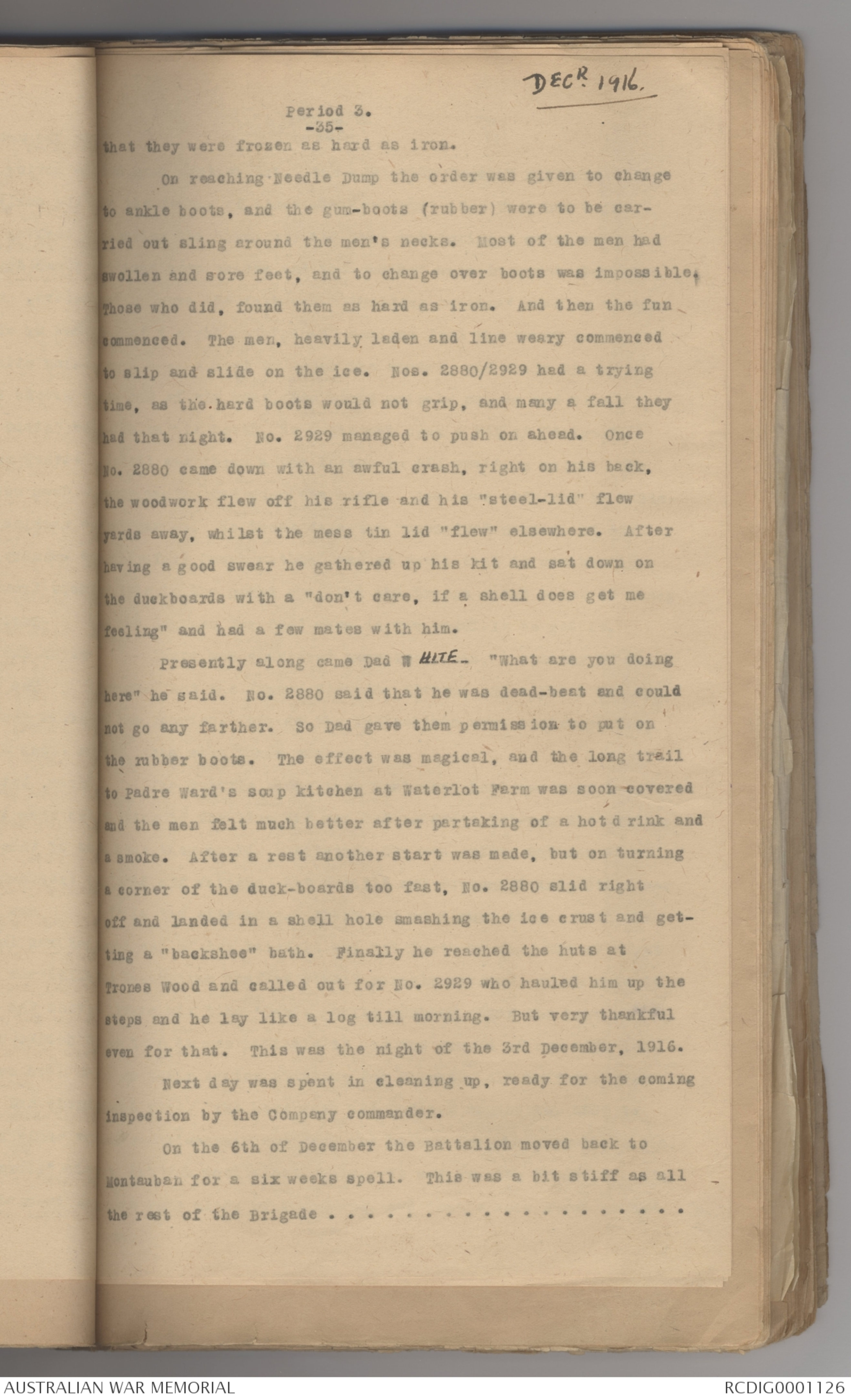
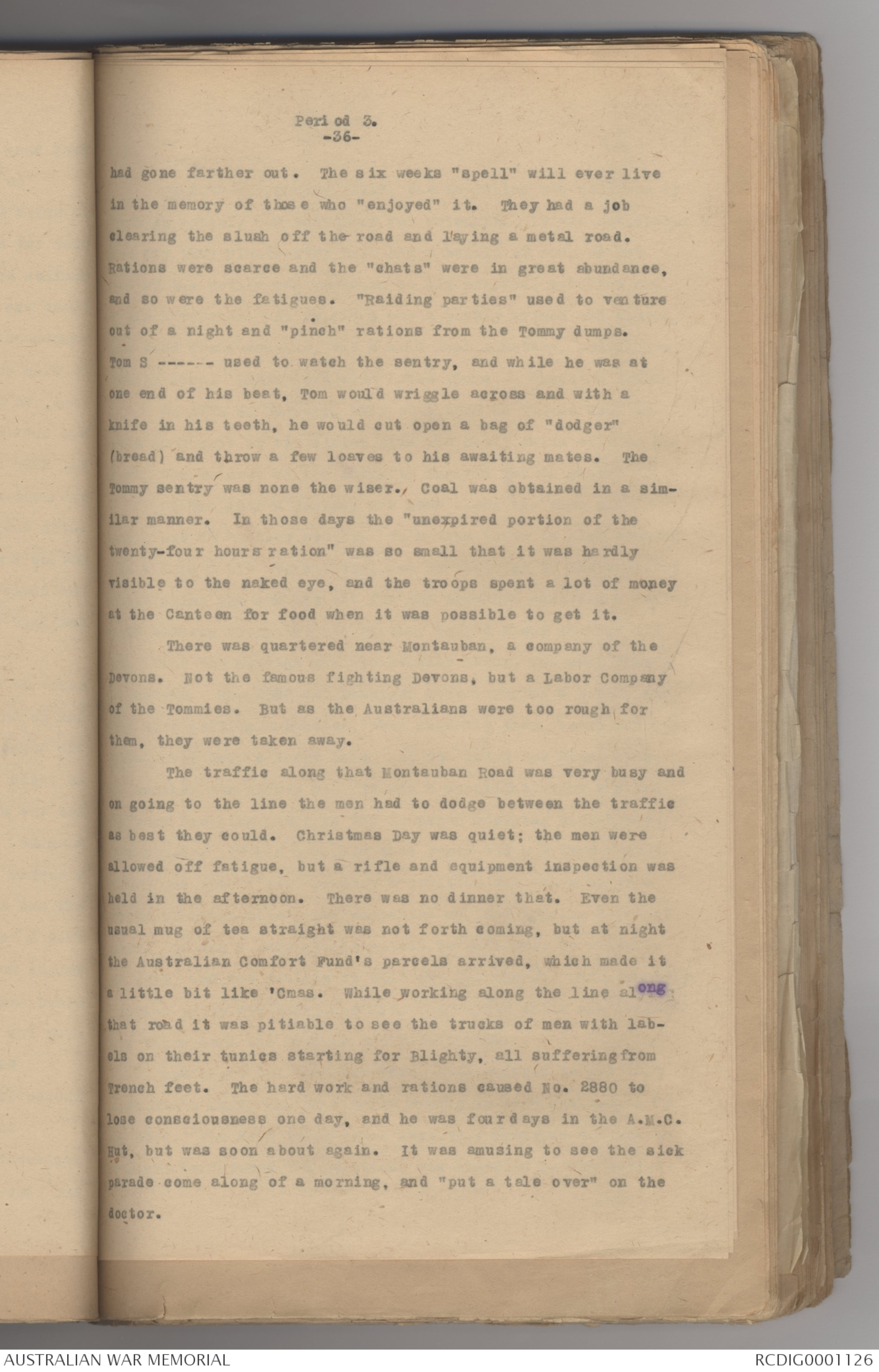
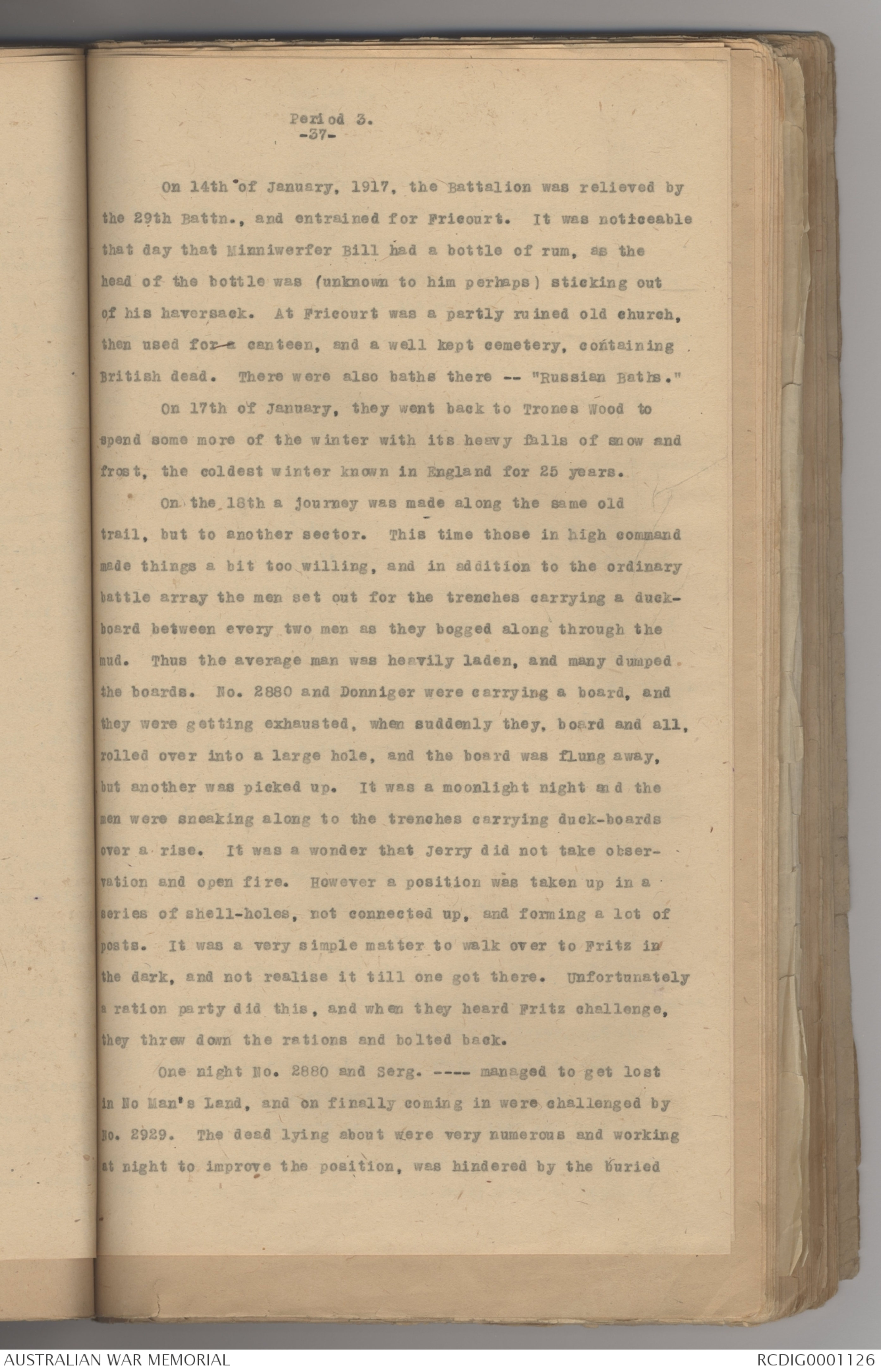
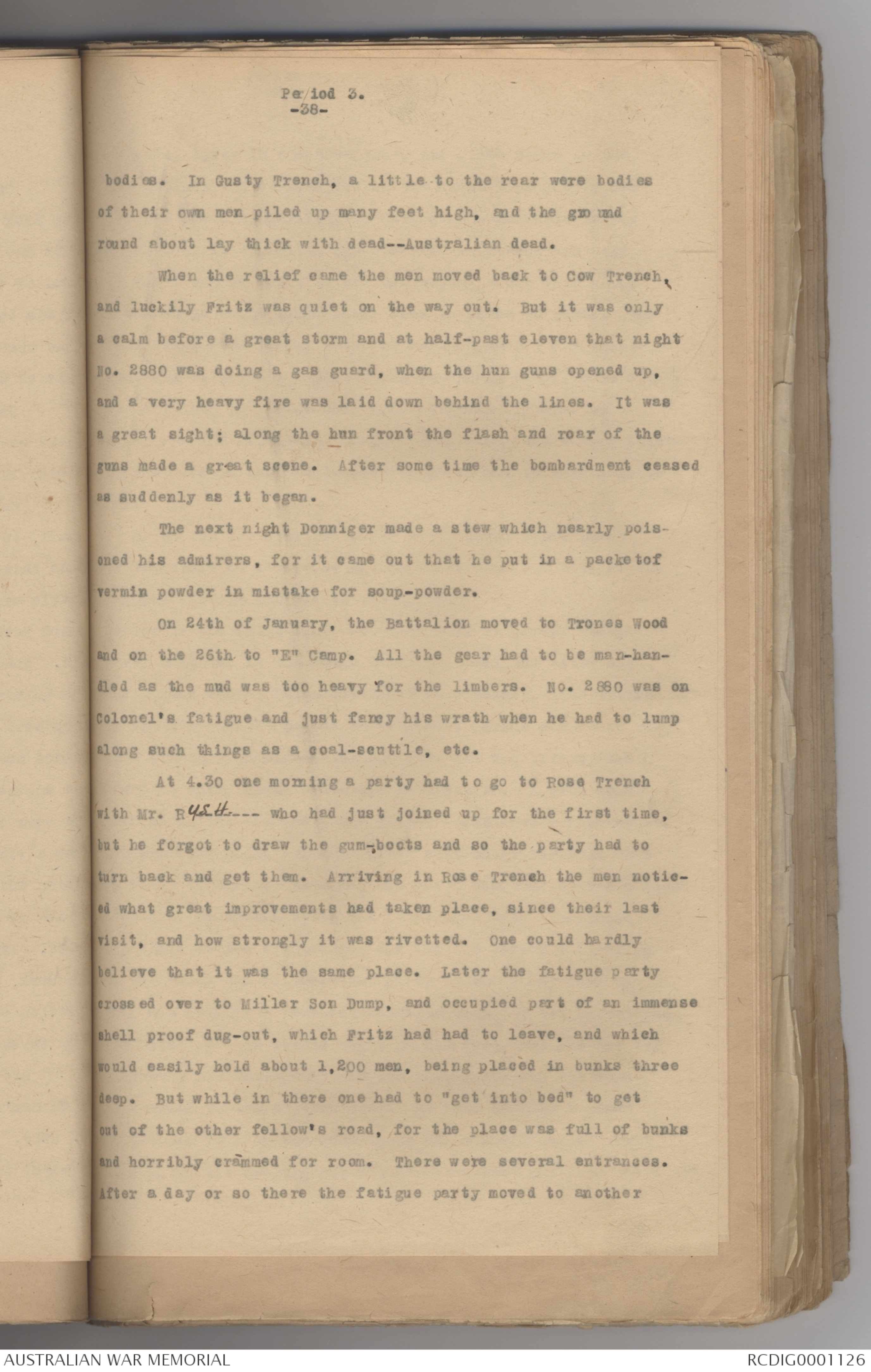
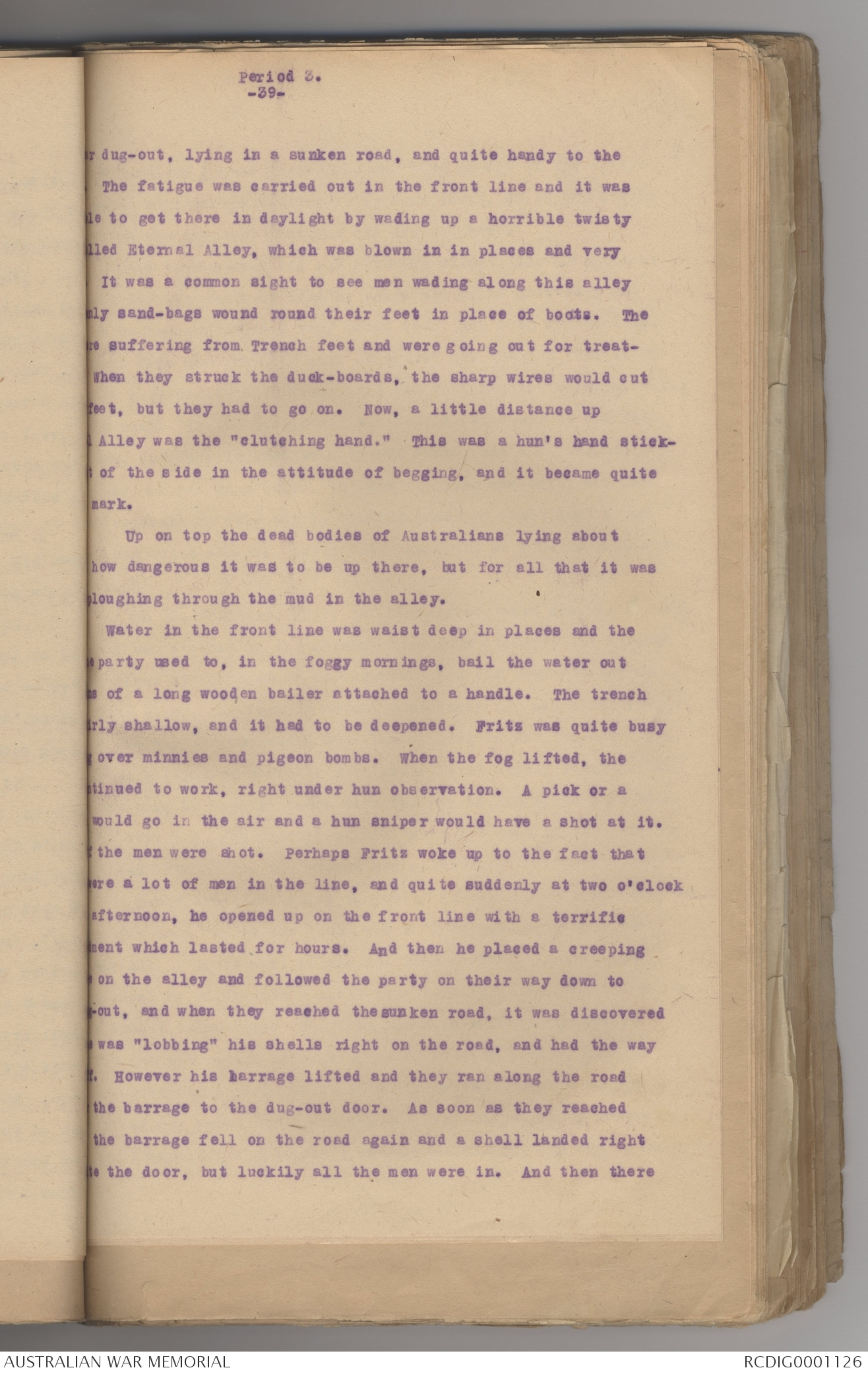
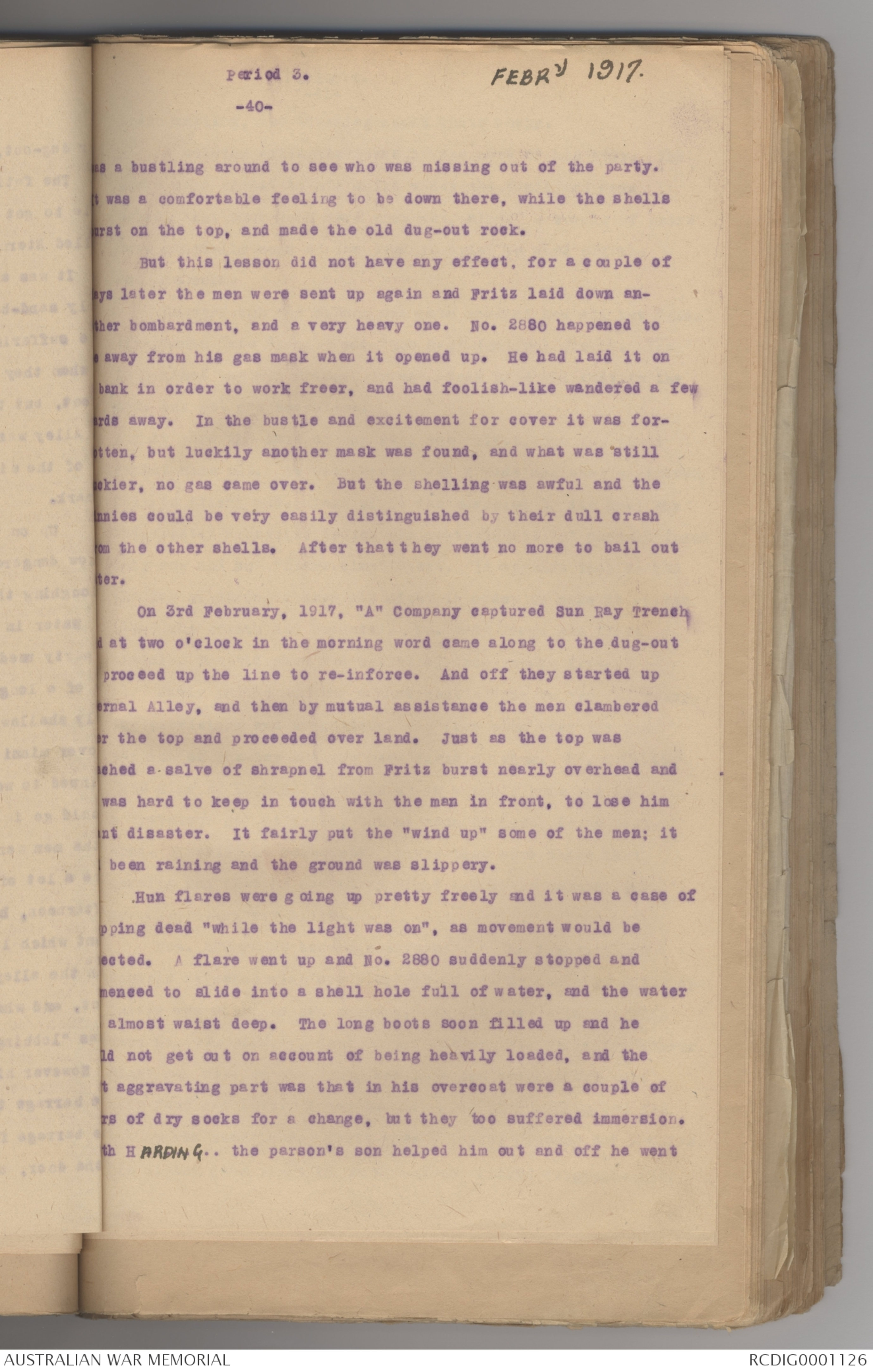
Period 3.
-31-
[[rt?]] death. It was cruel laying there all day half-frozen.
bombs had to be turned round every half-hour during the
night, or else they would freeze hard and fast into the side
[[of?]] the trench. A shallow sap ran out into the listening post.
[[from?]] this post it was possible to hear the huns talking, and one
[[could?]] see them, and it is a wonder that Fritz did not surround
[[his?]] lonely post, as he must have known of its existence. He had
[[outpost?]] out also and close to the other just mentioned. Perhaps
[[?]] accounted for it. He had a machine gunner in his line who
[[could?]] actually play a kind of melody when firing, much to the
tune "Lights Out." Very seldom did one come across that kind
gunner in France.
One night "Dad WHITE" came along the trench. The huns
[[must?]] have had a very bad trench, as in the dim half light they
[[could?]] be noticed standing head and shoulders above the parapet.
and they were not far away. So "Dad" gave orders for every man
to get ready to fire two rounds, when he fired his revolver. He
kept the men waiting for that signal, but it never came off.
Perhaps he had visions of the shells and Minnies which Fritz would
hurl back in return and left them well alone.
A raid came off. Sergeant "WORBOIES" (afterwards killed in
action) and Pte. KEENE (6th Reinf.) were sent out as a covering
party. About midnight a barrage of "flying pigs" and "stokes
was fired on the hun lines. The raid came off all right, but
unfortunately Pte. Keene was riddled with machine gun bullets,
and died at the dressing station, and lies buried in the Cemetary
not far from where the 14th Field Ambulance used to be, and
close to "E" Camp.
The patrols got hold of the idea of dressing in white when
patrolling No Man's Land in the snow. No doubt this was copied
from Fritz. One night the patrol went out, but only clothed in
white tunics, and as they moved along in the snow a keen observer
could only discern a line of legs moving. This was not too good
for safety.
The men with No. 2880 on the post were not aware of the
change
Period 3.
-32-
of attire of the patrol, and "Ruby" Gallagher, who was very nervy,
since his mate got killed on that stretcher bearing party at
Miller Son, became quite alarmed, when he sighted the legs, and
thought he was gazing across at the spirit world. All night
[[?ing]] Fritz was firing flares. He supplied most of the light.
[[?]] going in the first night No. 2880 was offered a so called
[[?g]]-out, but something told him to let it go and select another
[[and?]] later on one of their own shells fell short (perhaps the
cause of that was due to defective ammunition) and bursting
[[?ar]] the dug out wounded Corp. Sid WELLS who occupied it. Sid
[[used?]] for his pillow which daylight revealed, a skull, and it
became quite a joke afterwards. The funny part about it was that
[[?]] their own shells were falling short, Sid went down that long
[[and?]] deep communication sap to report it, and as soon as he came
back, one of the shells "got him." It was the 18 pounders that
were doing the damage.
The dug-outs, or rather shelters, consisted of sheets of
galvanised iron which formed the roof. When one comes to describe
them now, they are very laughable. They were not sufficiently
high enough to sit up in, nor long enough to lay out in,
[[just?]] wide enough for two men to crouch in. But they were
occupied by three men, which made it awful. Truly they were a
[[type?]] of dug-out as Bairnsfather puts it "in which one got out
[[?]] and again for a rest." It was not much use using them during
the day, as no blankets were carried, and the men's feet froze
[[and?]] caused much pain. To keep up blood circulation it was necessary
to massage the feet rapidly, or when it could be done, run
about. Truly it was "beaucoup froid" as the French call it.
[[Army?]] Cookers were issued and Dad EAslie hit upon the idea of
[[trying?]] to sleep with a burning cooker at his feet. Those little
cookers were a boon, and were issued by the Australian Comforts'
Fund. But they were not too plentiful in the line, worse luck.
[[Many?]] consisted of a small tin of solidified methylated spirits,
[[that?]] would boil two dixies of water. All night it was a case of
Period 3.
-33-
[[marking?]] time to keep up circulation and the men looked like a
[[lower?]] class of Esquimaux reinforcements on an iceberg from Lapland
or somewhere, attired in sheep skins and balaclava caps.
[[s?]] often jokingly remarked, all that they wanted to complete
the outfit was a set of horns and they would be reindeers.
After standing down of a morning it was usual to keep
[[guards?]] on during the day while the men rested - or rather tried
to rest. But not so at Le Transloy. Orders used to come around
that at eleven o'clock a barrage was to be laid on Fritz, and
all the men had to retire down the communication sap, till the
[[strafe?]] was over, as some of the artillery fire was expected to
fall short on account of inferior ammunition. This was carried
out, and a lot shrapnel did fall short, much to the horror of
Corp. PICKERING. The men lying in No Man's Land, who obviously
could not get in from the outpost in daylight, but had to suffer
it all, and take pot luck. However they were not hurt. Crouching
out there half-frozen and facing their own shells was no
pleasant experience for a man. But a war was on. At another
time orders came around that all men must not sleep after two
o'clock in the afternoon as some of the "heads: (Red Caps) were
making an inspection of the lines. Of course there was no sleep
of a night. Everyman stood to on the defence in case of a surprise
attack by the enemy. They seemed to forget that the men
had been "standing to" all night, while the "heads" were well
back in deep dug-outs. During this trip in Fritz strafed with
Whizz-bangs and heavier shells. As a rule the front line was
usually a safe place from the heavier gun fire. Itwas the support
line and the reserves that generally caught it hot.
In those days the term in the front line was fairly short
on account of the weather conditions, and when the night came
to bring the relief party up it was a most anxious time, and the
men often wondered whether they would be "stiff" enough to be
"knocked" going out.
In front of Le Transloy was a gentle rising ground, having
a road lined with trees at the top, being in full view from
Period 3.
-34-
from the men's trenches, along which hun transports were often
seen moving along with British shells hurrying them along.
In the early mornings the boys generally got in some shots at
hun working parties. There was not much use for the rifle
in those days, but the machine guns were very handy and destructive.
More or less the.303 Howitzer was out of action and
choked up with mud, and No. 2880 often had to use his as a
walking stick to avoid falling in the mud. But at this time
the ground was frozen, and great fogs came along which made
the "stand too" much longer. A fog was a great screen for
an attack and the first hour after dark and the hour before
the dawn were generally the most dangerous hours. At night
the machine guns on both sides were rattling away sweeping
the country, and doing damage to working parties and the
troops travelling in the open.
During this trip in. Bill SMITH and Jim SEADER
went on furlough to Blighty.
The Colonel had purchased a quantity of jam with some
comfort funds, and this was issued on "dry nights" when no
jam issue was given. In addition he purchased a few primus
stoves, but their life was short and sweet. The men had to
hump them to the line and then the N.C.Os. claimed first
use of them, and the poor private hardly ever saw them, and
so they dumped them in the mud.
The relief came in good time. As usual the Battalions
luck was in, and as they moved out Jerry (as the Tommies
called the hun) was quiet. Hurrying with all possible speed
across the "death trap" they "rode" those frozen duck boards
to Needle Dump where dixies of hot soup awaited them. The
men were wearing long rubber boots which gripped the ice
nicely and good progress was made. Previous to going in,
the ankle boots were stored at the dump. This is how they
were "stored." They were placed in the universal sand-bag
and exposed to the frost for four nights. The result was
[*DECR 1916*]
Period 3.
-35-
that they were frozen as hard as iron.
On reaching Needle Dump the order was given to change
to ankle boots, and the gum-boots (rubber) were to be carried
out sling around the men's necks. Most of the men had
swollen and sore feet, and to change over boots was impossible.
Those who did, found them as hard as iron. And then the fun
commenced. The men, heavily laden and line weary commenced
to slip and slide on the ice. Nos. 2880/2929 had a trying
time, as the hard boots would not grip, and many a fall they
had that night. No. 2929 managed to push on ahead. Once
No. 2880 came down with an awful crash, right on his back,
the woodwork flew off his rifle and his "steel-lid" flew
yards away, whilst the mess tin lid "flew" elsewhere. After
having a good swear he gathered up his kit and sat down on
the duckboards with a "don't care, if a shell does get me
feeling" and had a few mates with him.
Presently along came Dad WHITE ”What are you doing
here" he said. No. 2880 said that he was dead-beat and could
not go any farther. So Dad gave them permission to put on
the rubber boots. The effect was magical, and the long trail
to Padre Ward's soup kitchen at Waterlot Farm was soon covered
and the men felt much better after partaking of a hot drink and
a smoke. After a rest another start was made, but on turning
a corner of the duck-boards too fast, No. 2880 slid right
off and landed in a shell hole smashing the ice crust and getting
a "backshee" bath. Finally he reached the huts at
Trones Wood and called out for No. 2929 who hauled him up the
steps and he lay like a log till morning. But very thankful
even for that. This was the night of the 3rd December, 1916.
Next day was spent in cleaning up, ready for the coming
inspection by the Company commander.
On the 6th of December the Battalion moved back to
Montauban for a six weeks spell. This was a bit stiff as all
the rest of the Brigade
Period 3.
-36-
had gone farther out. The six weeks "spell" will ever live
in the memory of those who "enjoyed" it. They had a job
clearing the slush off the road and laying a metal road.
Rations were scarce and the "chats" were in great abundance,
and so were the fatigues. "Raiding parties" used to venture
out of a night and "pinch" rations from the Tommy dumps.
Tom S –– used to watch the sentry, and while he was at
one end of his beat, Tom would wriggle across and with a
knife in his teeth, he would cut open a bag of "dodger"
(bread) and throw a few loaves to his awaiting mates. The
Tommy sentry was none the wiser. Coal was obtained in a similar
manner. In those days the "unexpired portion of the
twenty-four hours ration" was so small that it was hardly
visible to the naked eye, and the troops spent a lot of money
at the Canteen for food when it was possible to get it.
There was quartered near Montauban, a company of the
Devons. Not the famous fighting Devons, but a Labor Company
of the Tommies. But as the Australians were too rough for
them, they were taken away.
The traffic along that Montauban Road was very busy and
on going to the line the men had to dodge between the traffic
as best they could. Christmas Day was quiet; the men were
allowed off fatigue, but a rifle and equipment inspection was
held in the afternoon. There was no dinner that. Even the
usual mug of tea straight was not forth coming, but at night
the Australian Comfort Fund's parcels arrived, which made it
a little bit like 'Cmas. While working along the line along
that road it was pitiable to see the trucks of men with labels
on their tunics starting for Blighty, all suffering from
Trench feet. The hard work and rations caused No. 2880 to
lose consciousness one day, and he was four days in the A.M.C.
Hut, but was soon about again. It was amusing to see the sick
parade come along of a morning, and "put a tale over" on the
doctor.
Period 3.
-37-
On 14th of January, 1917. the Battalion was relieved by
the 29th Battn., and entrained for Fricourt. It was noticeable
that day that Minniwerfer Bill had a bottle of rum, as the
head of the bottle was (unknown to him perhaps) sticking out
of his haversack. At Fricourt was a partly ruined old church,
then used for a canteen, and a well kept cemetery, containing
British dead. There were also baths there -- "Russian Baths."
On 17th of January, they went back to Trones Wood to
spend some more of the winter with its heavy falls of snow and
frost, the coldest winter known in England for 25 years.
On the 18th a journey was made along the same old
trail, but to another sector. This time those in high command
made things a bit too willing, and in addition to the ordinary
battle array the men set out for the trenches carrying a duckboard
between every two men as they bogged along through the
mud. Thus the average man was heavily laden, and many dumped
the boards. No. 2880 and Donniger were carrying a board, and
they were getting exhausted, when suddenly they, board and all,
rolled over into a large hole, and the board was flung away,
but another was picked up. It was a moonlight night and the
men were sneaking along to the trenches carrying duck-boards
over a rise. It was a wonder that Jerry did not take observation
and open fire. However a position was taken up in a
series of shell-holes, not connected up, and forming a lot of
posts. It was a very simple matter to walk over to Fritz in
the dark, and not realise it till one got there. Unfortunately
a ration party did this, and when they heard Fritz challenge,
they threw down the rations and bolted back.
One night No. 2880 and Serg. ---- managed to get lost
in No Man's Land, and on finally coming in were challenged by
No. 2929. The dead lying about were very numerous and working
at night to improve the position, was hindered by the buried
Period 3.
-38-
bodies. In Gusty Trench, a little to the rear were bodies
of their own men piled up many feet high, and the ground
round about lay thick with dead--Australian dead.
When the relief came the men moved back to Cow Trench,
and luckily Fritz was quiet on the way out. But it was only
a calm before a great storm and at half-past eleven that night
No. 2880 was doing a gas guard, when the hun guns opened up,
and a very heavy fire was laid down behind the lines. It was
a great sight; along the hun front the flash and roar of the
guns made a great scene. After some time the bombardment ceased
as suddenly as it began.
The next night Donniger made a stew which nearly poisoned
his admirers, for it came out that he put in a packetof
vermin powder in mistake for soup-powder.
On 24th of January, the Battalion moved to Trones Wood
and on the 26th to "E” Camp. All the gear had to be man-handled
as the mud was too heavy for the limbers. No. 2880 was on
Colonel's fatigue and just fancy his wrath when he had to lump
along such things as a coal-scuttle, etc.
At 4.30 one morning a party had to go to Rose Trench
with Mr. RUSH–-- who had just joined up for the first time,
but he forgot to draw the gum-boots and so the party had to
turn back and get them. Arriving in Rose Trench the men noticed
what great improvements had taken place, since their last
visit, and how strongly it was rivetted. One could hardly
believe that it was the same place. Later the fatigue party
crossed over to Miller Son Dump, and occupied part of an immense
shell proof dug-out, which Fritz had had to leave, and which
would easily hold about 1,200 men, being placed in bunks three
deep. But while in there one had to "get into bed" to get
out of the other fellow's road, for the place was full of bunks
and horribly crammed for room. There were several entrances.
After a day or so there the fatigue party moved to another
Period 3.
-39-
[[?r]] dug-out, lying in a sunken road, and quite handy to the
[[?]]. The fatigue was carried out in the front line and it was
[[possible?]] to get there in daylight by wading up a horrible twisty
[[called?]] Eternal Alley, which was blown in in places and very
[[?]] It was a common sight to see men wading along this alley
only sand-bags wound round their feet in place of boots. The
[[re?]] suffering from Trench feet and were going out for treatment
[[?]] When they struck the duck-boards, the sharp wires would cut
[[?]] feet, but they had to go on. Now, a little distance up
[[Eternal?]] Alley was the "clutching hand." This was a hun's hand sticking
[[out?]] of the side in the attitude of begging, and it became quite
[[?]] mark.
Up on top the dead bodies of Australians lying about
[[?]] how dangerous it was to be up there, but for all that it was
ploughing through the mud in the alley.
Water in the front line was waist deep in places and the
[[?]] party used to, in the foggy mornings, bail the water out
[[?]] of a long wooden bailer attached to a handle. The trench
[[fairly?]] shallow, and it had to be deepened. Fritz was quite busy
[[sending?]] over minnies and pigeon bombs. When the fog lifted, the
[[?]] continued to work, right under hun observation. A pick or a
[[?]] would go in the air and a hun sniper would have a shot at it.
[[?]] of the men were shot. Perhaps Fritz woke up to the fact that
[[there?]] were a lot of men in the line, and quite suddenly at two o'clock
[[that?]] afternoon, he opened up on the front line with a terrific
[[?ment]] which lasted for hours. And then he placed a creeping
[[barrage?]] on the alley and followed the party on their way down to
[[? dug-out?]], and when they reached the sunken road, it was discovered
[[?]] was "lobbing" his shells right on the road, and had the way
[[?]] However his barrage lifted and they ran along the road
[[?]] the barrage to the dug-out door. As soon as they reached
[[?]] the barrage fell on the road again and a shell landed right
[[?]]te the door, but luckily all the men were in. And then there
FEBRY 1917.
Period 3.
-40-
as a bustling around to see who was missing out of the party.
[[?it]] was a comfortable feeling to be down there, while the shells
burst on the top, and made the old dug-out rock.
But this lesson did not have any effect, for a couple of
days later the men were sent up again and Fritz laid down another
bombardment, and a very heavy one. No. 2880 happened to
be away from his gas mask when it opened up. He had laid it on
[[?]] bank in order to work freer, and had foolish-like wandered a few
yards away. In the bustle and excitement for cover it was forgotten,
but luckily another mask was found, and what was still
luckier, no gas came over. But the shelling was awful and the
[[minnies?]] could be very easily distinguished by their dull crash
[[from?]] the other shells. After that they went no more to bail out
[[?ter.]]
On 3rd February, 1917. "A" Company captured Sun Ray Trench
[[?]] at two o'clock in the morning word came along to the dug-out
[[to?]] proceed up the line to re-inforce. And off they started up
Eternal Alley, and then by mutual assistance the men clambered
[[over?]] the top and proceeded over land. Just as the top was
[[reached?]] a salvo of shrapnel from Fritz burst nearly overhead and
[[it?]] was hard to keep in touch with the man in front, to lose him
[[meant?]] disaster. It fairly put the "wind up" some of the men; it
[[had?]] been raining and the ground was slippery.
Hun flares were going up pretty freely and it was a case of
[[stopping?]] dead "while the light was on", as movement would be
[[detected?]]. A flare went up and No. 2880 suddenly stopped and
[[commenced?]] to slide into a shell hole full of water, and the water
[[was?]] almost waist deep. The long boots soon filled up and he
[[could?]] not get out on account of being heavily loaded, and the
[[most?]] aggravating part was that in his overcoat were a couple of
[[pairs?]] of dry socks for a change, but they too suffered immersion.
[[th?]] HARDING.. the parson's son helped him out and off he went
 Ray Stenhouse
Ray StenhouseThis transcription item is now locked to you for editing. To release the lock either Save your changes or Cancel.
This lock will be automatically released after 60 minutes of inactivity.